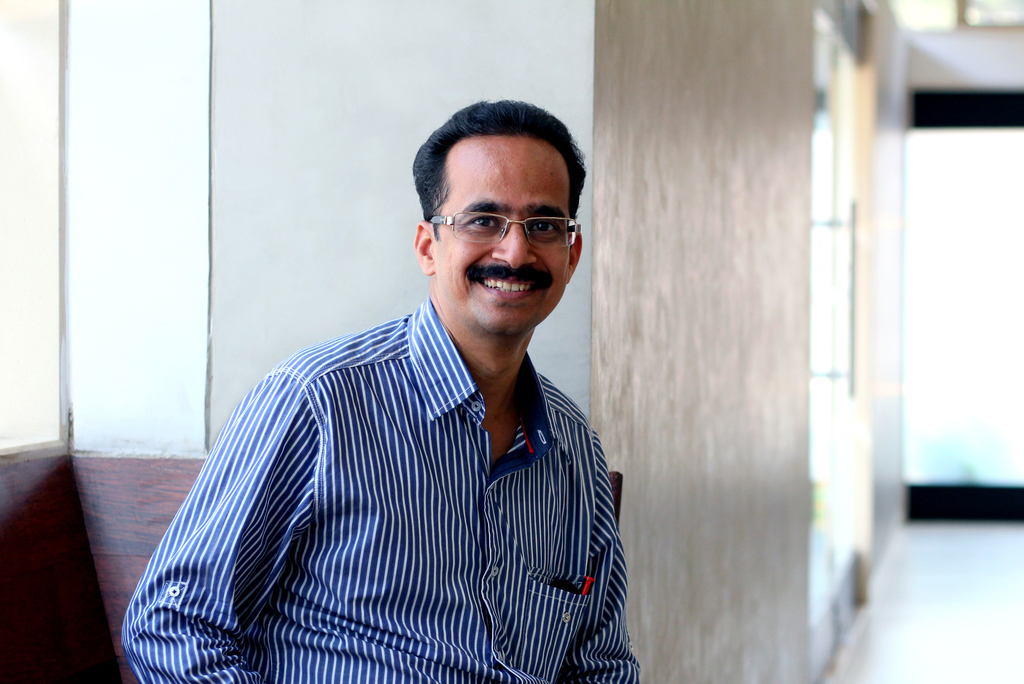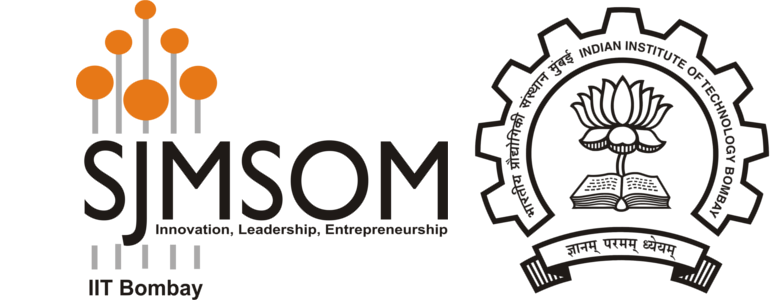| Professor 104, Shailesh J. Mehta School of Management, I.I.T.Bombay, Powai, Mumbai 91-22-25767792 +91-9819613568 ashish.pandey[at]iitb.ac.in |
 |
Current Position:
Professor, Shailesh J. Mehta School of Management, Indian Institute of Technology Bombay (IITB), Mumbai
Previous Position
Assistant Professor (Sept. 2009 to May, 2018). Shailesh J. Mehta School of Management, Indian Institute of Technology Bombay (IITB), Mumbai
TEACHING
Teaching following courses in Master of Management (MoM) Program:
- Human Resource Management
- Management of Change
- Self-Awareness and Interpersonal Skills Workshop Course
- Co teaching Business Ethics
RESEARCH
Ashish has research interest in broadly three areas; mindfulness and yoga and its relevance in the field of management, spirituality at workplace and business and society interface and best practices in management and OD. Following list of his research publications reflects his research work:
Mindfulness and Yoga and their Relevance to the Field of Management
-
- Pandey A, Chandwani R, Navare A. (2018) How can mindfulness enhance moral reasoning? An examination using business school students. Business Ethics: A European Review. 27(1), pp. 56–71.
-
- Dagar, C., Pandey A, Navare A., How Yoga Based Practices Results In Human Flourishing?” Slated for oral presentation during the Academy of Management 2018 Annual Meeting, August 10 – 14, in Chicago
-
- Pandey, A., Navare, A. V., &Chandwani, R. (2017). What Yoga got to do with Positive Psychology: A Study of the Connections and Associated Mechanism. Academy of Management Proceedings, 2017(1). pp. 16831. Academy of Management.
-
- Pandey, A., Chandwani, R., &Navare, A. (2015). Enhancing Moral Reasoning (in Business School): A Mindfulness Perspective. Academy of Management Proceedings 2015(1), pp. 17736. Academy of Management.
Spirituality at Workplace
-
- Pandey A and Navare A. (2018). Paths of Yoga: Persepctive for Workplace Spriituality, in Dhiman S., Roberts, G.E. and Crossman, J. E. (edis.) The Palgrave Handbook of Workplace Spirituality and Fulfillment, Pub. Palgrave, the concern of Springer (accepted for publication)
-
- Belwalkar, S. and Vohra, V. and Pandey A. (2018). The relationship between workplace spirituality, job satisfaction and organizational citizenship behaviors – an empirical study, Social Responsibility Journal, 14(2), pp. 410-430.
-
- Pandey, A., Gupta, R. K., & Gupta, V. (2017). Spirituality and Innovative Behavior in Teams: Examining the Mediating Role of Team Learning, IIMB Management Review (accepted for publication)
-
- Pandey, A. (2017). Workplace Spirituality: Themes, Impact and Research Direction, South Asian Journal of Human Resource Management, 4(2), pp. 212-217.
-
- Pandey, A., Gupta, R. K., & Kumar, P. (2016). Spiritual Climate and Its Impact on Learning in Teams in Business Organizations. Global Business Review, 17(3 suppl), 159S-172S.
-
- Pandey, A., Chattopadhyay, D., & Bose, S. (2015). The impact of leaders’ spirituality at work and their reputation on teams’ spiritual climate. International Journal of Indian Culture and Business Management, 11(4), 473-495.
-
- Pandey, A. and Gupta, R.K. (2013), Spiritual Climate of Business Organizations and its Impact on Customers’ Experience in Cornelissen, R.M.M, Misra, G., Varma, S. (edis), Foundations and Applications of Indian Psychology, Pub. Pearson.
-
- Pandey, A., Gupta, R.K. and Arora, A.P. (2009), Spiritual Climate of Business Organizations and Its Impact on Customers’ Experience, in Journal of Business Ethics, 88, pp. 313-332.
-
- Pandey, A., Gupta, R.K. and Arora, A.P. (2009). Spiritual Climate Inventory, Pfeiffer Annual for Consulting, San Francisco, U.S.A
-
- Pandey, A. and Gupta, R. K. (2008). Spirituality in Management: Review of Traditional and Contemporary Literature and Agenda for Future Research, Global Business Review, 9(1),65-84,
Business and Society Interface
-
- Pandey, A. and Gupta, R. K. (2008). A perspective of Collective Consciousness of Business Organization. Journal of Business Ethics, 80(4), 889-898.
-
- Pandey, A. and Sehgal, P. (2007). Values Audit of Management Students. Indian Journal of Training and Development, 37(2), 15-28.
-
- Sinha, J.B.P. and Pandey A. (2007). Indian Mindset and Condition That Provoke Them. Psychological Studies, 52(1), 1-13.
-
- Sinha, J. B., Singh, S., Gupta, P., Srivastava, K. B., Sinha, R. B. N., Srivastava, S., … & Pandey, A. (2010). An exploration of the Indian mindset. Psychological Studies, 55(1), 3-17.
Best Practices in Management and Organization Development
-
- Pandey, A., Gupta, R.K. (2013), Stimulating Appreciative Mindset, The Application of Indian Traditional Wisdom for Effective Appreciative Inquiry-Based Interventions, AI Practitioner, 14(11),pp. 21-24
-
- Pandey A. and Singh, B., (2009), Implementing Wholesome Leadership Development Process at SEW: An Action Research, in Sharda N.andSengupta, S.S. (edis), Spirituality and Leadership, Pub. Springer.
-
- Pandey A. and Bhatnagar, J. (2008), HR and Six Sigma in India Based MNCs, in Budhwar, P. and Bhanagar, J. (eds.), Changing Face of People Management in India, Pub. Routeledge.
-
- Pandey, A. (2007). Strategically focused Training in Six Sigma Way: A Case Study, The Journal of European Industrial Training, 31(2),145-162
-
- Pandey, A., Gupta R. K, and Roy, B. (2006). Contribution of affectivity in Organization Learning: A Case Study. Management and Change, 10(2), 77-100.
-
- Pandey, A. and Bhatnagar, J. (2005). HR Matrices: HR Six Sigma in Indian Organization, Management and Labour Studies, 30(4).
LEADERSHIP DEVELOPMENT PROCESS
We mostly conduct in-house Leadership Development Programs. The basic tenets behind the LDP approach and design we follow are that organization development and leadership development are intractably linked and LDP process requires judicious mix of classroom instructions and action learning opportunities.
COMPONENTS OF THE PROCESS
Generally, we follow the 4 steps process for the Leadership Development Program (LDP):
a. Organizational Diagnosis and Preparation Activities: This step involves thorough understanding of the business to evolve leadership competencies and identification of specific learning objectives for the participants. Assessment of the participants is also done through psychometric methods.
b. Development and validation of Customized Learning Modules: Learning modules are designed based on the learning objectives identified in diagnostic process.
c. Delivery of the Learning Modules: Session are generally offered on IIT Bombay campus. Sessions are interactive, learners’ centric, experiential and based on adult learning principles. Final content is customized according to the specific need of the organization. We use judicious mix of case analysis, discussion method, lecture method, and experiential learning methods based on adult learning principles and the science of instruction design.
For different topics in modules appropriate faculty will be assigned. Faculty of the program will be either academicians’ who are experts in their area of delivery and/or business leaders or practicing managers who have been very successful and accomplished in their field.
d. Action Learning Projects: During the intervention, the participants are facilitated to identify action points to implement the desired change in the organization. These projects give participants an opportunity to apply the classroom learning at workplace.
In House programs/intervention in area of Leadership Development Process:
- Toyo Engineering
- Citec Engineering
- ACG Worldwide
- Axis Bank
- ACC Concrete
- Anchor by Panasonic
- General Mills India Centre
- Shipping Corporation of India
Organization Development
Ashish’s OD work is inspired by values of collaboration, empowerment, self-awareness, creativity and innovation. The core of Ashish’s approach is drawn and informed by complex adaptive systems thinking, strategic OD, positive psychology, techniques of Yoga based and mindfulness based practices of self-growth and evolution of collective consciousness. Ashish effectively uses the methods of Appreciative Inquiry, Open Space Method, and embedded learning methods based on technology enabled interventions for his development work with business organizations, government agencies and educational institutions.
Organisation Development
- Energia Well Being
- School of Management of KIIT University
- Axis Bank
- ACG Worldwide
- General Mills
- VFS Global
- Pragati Leadership Institute
Institution Building Assignment and Faculty Development Program
- Institute of Chemical Technology, Matunga, Mumbai India
- Dr.Bhimrao Ambedkar Technological University, Lonere
- Walchand College of Engineering
- Regularly imparting Faculty Development Program under Pandit Madan Mohan Malaviya National Mission on Teachers and Teaching
- Associate Faculty of Parimal and PramodChaudhari Centre for Learning and Teaching (PPCCLT) at IIT Bombay
Awards by Management Practitioners’ and Academic Bodies
- Recognized by Fowler Centre of Business as Agent of World Benefit with AIM2Flourish Prizes in June, 2017 for the publication of the exemplar case studies.
(Full financial support to me and the four students worked on the project for traveling to Case Western University, Cleveland from Mumbai, attending the Fourth Global Forum for Business as an Agent of World Benefit in Cleveland, Ohio and stay for the stay) - IBA Best Paper Award in COSMAR- 2006, (Consortium of Students of Management Research) Indian Institute of Sciences (I. I. Sc.)
- The Best Paper Award in the Global OD Summit, 18-20 Sept. 06 at SDM-IMD and Infosys Leadership Institute, Mysore
- 2nd Best Paper Award at I.I.M., Indore in Doctoral Competition, during International Conference of AIMS, 28 -31 Dec. 2006
- Sathya Sai BalVikas Alumni India Achievement Award, 2012 at PrashantiNilayam, Puttaparthi for incorporating values based education and research in academic career.
- National Merit Scholarship, 1992-1993
Invited Lectures
MTHR Global, L&OD Roundtable, Trainers Forum, U.P. Yoga Festival organized by Patanjali Foundation, IIM Ahmedabad, Anna University Chainnai, RavindraNath Tagore University Bhopal, Solapur University, SNDT University Mumbai etc. on varied topics ranging from HR Function, leadership, Yoga Psychology and Research approaches and methods in management and social sciences.
Previously Held Position
- May 2007 – Sept 2009, Research Leader, Pragati Leadership Institute Pvt. Ltd.
- Jun 1999 – June 2004, Various Managerial Positions in Corporate Sector
Academic Qualification:
PhD level Fellow Program in Management (FPM)from Management Development Institute (M.D.I.), Gurgaon, 2004-2007;
Master of Business Administration (MBA) – University Institute of Management 1997-99, R.D.V.V., Jabalpur, (M.P.) Major Specialization both HRD and Marketing (with First Div.)
Bachelor of Science (B.Sc.)– Govt. Autonomous Science College, Jabalpur (M.P.) in Life Sciences (With First Div.) 1994-97
Professional Development Workshop:
- Global Colloquium for Participants Centric Learning in Harvard Business School in July, 2013.
- Yoga Teachers Training Program organized by Patanjali Foundation, Aug.-Sept, 2016
- Workshop on Research on Yoga: Methods and Measurement organised by Patanjali Research Foundation, Haridwar on September 2-3, 2017
Personal Information:
Date of Birth: 6th Jan. 1976
Marital Status: Married, lives in IIT Bombay campus with wife, a 13 years old daughter and about 9 years old son
